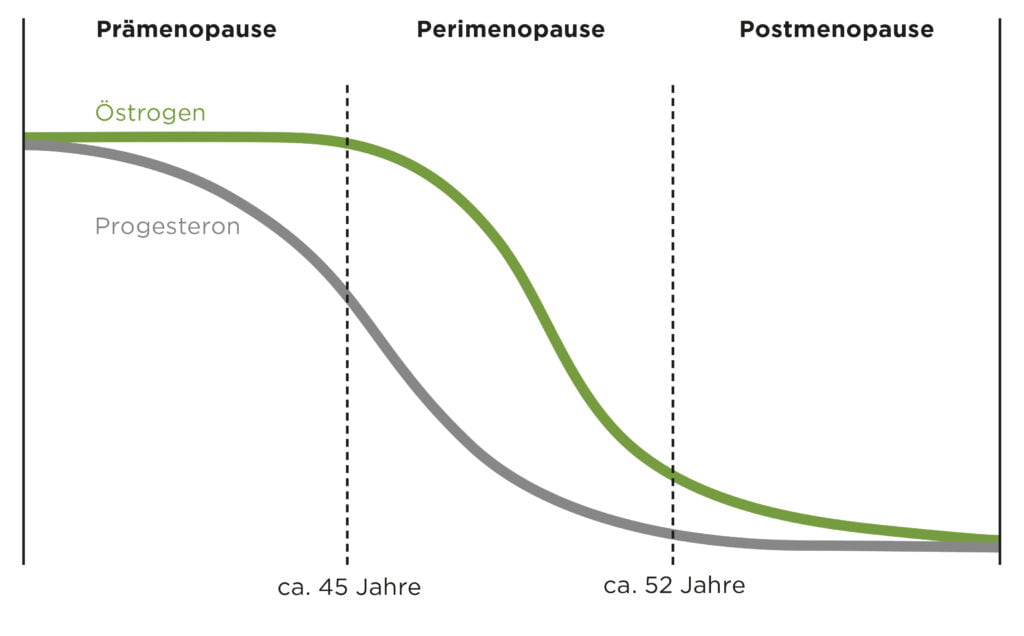Menopause: dietary supplements for support
Important facts about the menopause
During the menopause, women go from fertile to infertile years; it is a phase of hormonal change. This change usually lasts for years or decades and is characterised by symptoms in around two thirds of women in this country. The medical term for the menopause is climacteric and is divided into different phases. The first phase is known as the premenopause (pre=before), followed by the perimenopause (peri=around), the actual menopause. The last menstrual period is called the menopause (men=month), which can only be determined retrospectively when there has been no more bleeding for at least a year. The period after this is known as the postmenopause (post=after). After the last menstrual period, it often takes some time for the woman to get used to the new hormonal situation. For most women, the perimenopause begins in their early to mid-forties, with the menopause taking place on average at around 52 years of age.
The female sex hormones already begin to change slowly during the premenopause. In the early perimenopause, the sex hormone progesterone decreases more and more, while the oestrogens remain more or less unchanged. As these sex hormones work very closely together and must always be considered in relation to each other, the drop in progesterone often results in a relative oestrogen dominance. In the later perimenopause, oestrogen production also decreases. After the last menstrual period, progesterone and oestrogen levels remain at a low level. These are all reasons for various symptoms.

Common complaints during the menopause
Just as every woman is different, menopausal symptoms and their intensity vary from woman to woman. For some, they are only slightly pronounced, others suffer greatly from the changes, while some women get through this time without any problems at all.
The most common known symptoms include
- shortened cycle, bleeding between periods, also extremely heavy and/or long periods
- Mood swings, irritability
- Depression
- Difficulty concentrating
- Anxiety
- Sleep disorders
- Water retention in the tissue
- sensitive breasts, breast tenderness
- increased premenstrual syndrome (PMS)
- Weight gain
- Impaired thyroid function
- Hot flushes, sweating, blushing (flash)
- Vaginal dryness
- Increased vaginal and urinary tract infections
- Loss of libido
- Joint and muscle pain
- Brain fog; forgetfulness, difficulty concentrating, impaired memory, etc.
- Nervousness, restlessness
- Tiredness, exhaustion
- Sleep problems
- Dry skin, wrinkling
- Hair loss, thinning, dry hair

What can women do to combat menopausal symptoms?
With a conscious, healthy diet, regular exercise and muscle training as well as a reduction in stress and a good work-life balance, the chances of getting through this turbulent time are high!
- Nutrition
- Exercise
- Relaxation
An optimal diet contains as many micronutrients (vital substances) and secondary plant substances, healthy fats, sufficient (especially plant-based) protein and fibre as possible. Avoid refined sugar and sweets, white flour products, unhealthy fats and convenience food as much as possible. Healthy food can taste delicious! Get creative and treat your body to varied menus from which it can stock up on important substances that can ensure that the menopause runs as smoothly as possible.
Make sure you exercise regularly so that you work up a sweat several times a week and your heart rate rises; “female-friendly” muscle training is also very important during this phase of life. Muscle training does not necessarily have to take place with equipment in the fitness centre, but can also be done with special exercises using your own body weight and/or training bands and dumbbells. Sport not only strengthens muscles and bones, but also the psyche and self-confidence, and exercise also has a positive effect on hormone production.
Negative, chronic stress, in whatever form, is poison for our hormones! Therefore, try to reduce stress in your life as much as possible. Not all women feel stressed in the same way and not all women have the same stressors. Find out what stresses you out and proactively counteract your personal stress.
These three points are very important and form the basis for getting through the menopause as well as possible. Micronutrients can also be taken as dietary supplements.
The most important micronutrients for women during the menopause
In addition to the symptoms, there are new requirements for the supply of nutrients; after all, the body is undergoing a lot of changes and women have a much greater need for vital substances than before. In addition, the body is no longer able to absorb nutrients as well as in younger years. However, it is possible to counteract menopausal symptoms by taking in the right micronutrients. A healthy lifestyle can also do a lot to prevent the symptoms from becoming too severe in the first place.

The following nutrients increase in demand during the menopause and can support women during this time:
Amino acids
Proteins consist of many chains of smaller units called amino acids. They are needed for a number of bodily functions; they are important for muscle building and for other body tissues such as bone tissue and bone density. We also need them for various biochemical reactions, including the production of hormones and for the body’s defence against disease. A complete amino acid profile of all 9 essential amino acids can only be achieved by combining a variety of protein-rich foods, which becomes all the more important from midlife onwards.
Omega-3 fatty acids
Omega-3 fatty acids not only have a positive effect on the heart, but also on the brain and have anti-inflammatory properties.
Co-enzyme Q10 and NADH
From midlife onwards, the body’s production of its own coenzyme Q10 decreases steadily, which can lead to a noticeable loss of energy. NADH is also needed in the cells to produce energy.
B vitamins
The eight B vitamins all fulfil important tasks in the body. For example, they contribute to normal energy metabolism and to reducing tiredness, as well as supporting normal mental performance and counteracting stress. And these are just a few of the functions of the vitamin B complex. As women often have problems in these areas during the menopause, the need for B vitamins should always be covered.
Vitamin C, E and zinc
The combination of vitamin C, E and zinc supports the immune system and protects cells from oxidative stress.
Vitamin D
Vitamin D3 is essential for the mineralisation of our bones, it regulates the absorption of calcium and phosphate in the intestine and their incorporation into the bones. The special thing about vitamin D is that we can produce it in our skin, but only with sufficient sunlight. In our latitudes, there is not enough sunlight between October and April to produce the sun vitamin in the skin. According to the FOPH (Federal Office of Public Health), at least half of the Swiss population has a deficiency(Federal Office of Public Health 2012. Vitamin D deficiency: data, safety and recommendations for the Swiss population). Only a small proportion of the vitamin can be absorbed through food; it is contained in small amounts in mushrooms, eggs, cheese, salmon, herring and tuna.
Vitamin K
Vitamin K2 works closely with vitamin D3, magnesium and calcium. It is important for bones and joints, but also keeps the arteries flexible.
Calcium
The risk of osteoporosis (“bone loss”) increases during the menopause. For this reason, calcium is an essential nutrient during the menopause.
Iron
Iron is a vital trace element and is required for numerous processes. It contributes to the formation of red blood cells, ensures the transport of oxygen and is involved in energy metabolism. An iron deficiency leads to tiredness, loss of performance, concentration problems, increased susceptibility to infections, hair loss and many other possible symptoms.
Magnesium
Magnesium is a true all-rounder and therefore indispensable during the menopause. The mineral is important for bones, muscles and nerves, can lift the mood, relieve the psyche, improve sleep and reduce stress. Magnesium is also a popular aid for muscle relaxation.
Isoflavones
Isoflavonesare plant substances that are similar in chemical structure to the female sex hormone oestrogen. They are therefore also known as phyto-oestrogens . They can help to stabilise the hormonal balance that is altered during the menopause. According to studies, Asian women are said to have the least menopausal symptoms as they regularly include soya in their diet and these beans are full of isoflavones.
Dietary supplements for the menopause: what women should consider
On the one hand, it is the increased nutritional requirements that can make taking dietary supplements useful, on the other hand, they can alleviate symptoms and improve quality of life. As the female body undergoes major changes during the menopause, its need for nutrients is also increased. For this reason, dietary supplements can help to provide the body with the necessary nutrients. However, women should pay attention to certain points when buying food supplements. There are many products on the market that differ in terms of quality.
Women should therefore consider the following factors:
high quality of the products
natural ingredients
careful production
Sustainability
In order to know which products could be suitable for each individual woman, it may be useful to clarify any deficiencies before taking the relevant products. Women should also bear in mind that food supplements never replace a healthy and balanced diet, but rather supplement it (food supplementation)!

